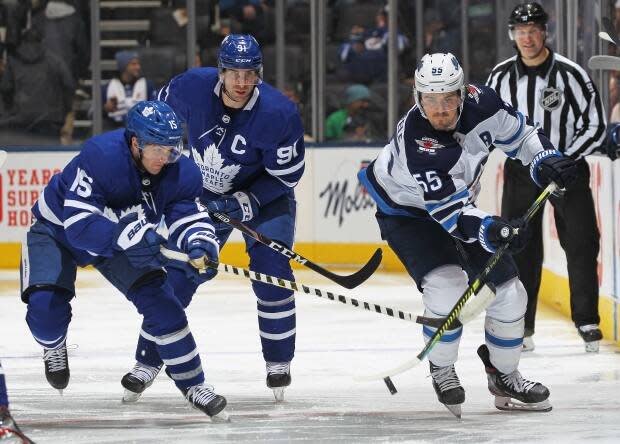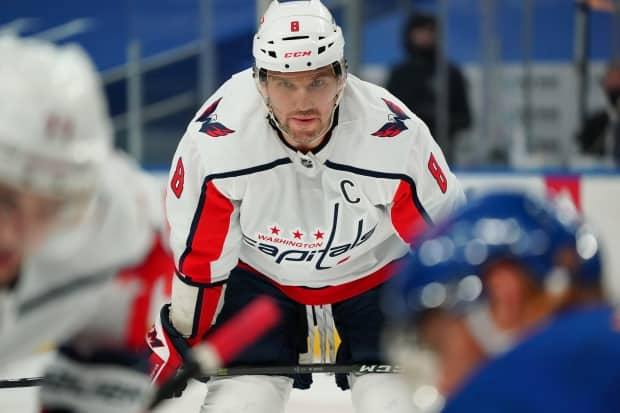To battle pandemic, NHL players know they must hold each other accountable
Back in September, after the Tampa Bay Lightning were awarded the Stanley Cup, the NHL announced over 33,000 tests were administered during 65-playoff days in the Edmonton and Toronto bubbles with zero positive results for COVID-19.
That was then. Things are different now.
Since the NHL resumed play earlier this month with teams playing in a division format, players have tested positive for the coronavirus, practices have been cancelled and games postponed.
The positive tests are to be expected, said Dr. Susy Hota, medical director of infection prevention and control, and an infectious disease specialist at the University Health Network in Toronto — even with the protocols and safety measures implemented by the NHL and its teams.
"I wouldn't say it's surprising at all," said Hota, who also is an associate professor in the department of medicine at the University of Toronto. "The bubble is a very controlled environment but it's also artificial. It's not going to be reflective of what happens if you open things up and people are going in and out into the communities.
"It's a mixing of populations. It's going to be much more difficult to manage things out of a bubble, even with the same measure of testing."
WATCH | Week 1 roundup of the NHL's North Division:
Vancouver Canucks defenceman Jordie Benn and forward J.T. Miller both missed games due to the NHL's COVID-19 protocols.
Benn said he had "no idea" how he contracted the virus.
"I didn't have any symptoms," he said. "I felt good for the 10 days I was in isolation. You see people that are in hospital and taking it a bit harder. It's a weird virus."
The NHL has prepared a list of "preventative measures" for players and team officials to avoid COVID-19. Included is staying at home, not engaging "in unnecessary interactions with non-family members", wearing face coverings and avoiding going to "restaurants, bars and clubs."
Players understand importance
Earlier this month the Winnipeg Jets were forced to cancel a practice due to COVID-19 concerns. Centre Mark Scheifele said the players understand the importance of being careful.
"It's kind of what we have been doing for the last 10 months, since this all started," he said. "Wear your mask, wash your hands, keep your social distance from people. That's all you can really do, worry about yourself, control your own environment.
"That comes to every single guy on this team, every single guy in the league. You all have to hold each other accountable for their actions and abide by all those protocols that have been set forth by the professionals that we are relying on."

Vancouver forward Tanner Pearson said concerns about the virus have changed players activities both at home and on the road.
"On the road, you can pretty much go for a walk and that's it," he said. "There are no dinners with teammates on the road, no dinner with friends.
"When I'm at home, I want to be with [my son] and the family as much as possible."
Unknown exposure
Hota said the risk of exposure doesn't end with the players. Many have families. Their children attend schools, wives shop at the supermarket.
"You look at the experience we've had within the hospitals and healthcare workers who are being very vigilant and are aware of what the transmission risks are," she said. "We continue to have people being exposed from their family members who test positive or from other unknown community-type exposures."
Heading into last weekend there were 21 names on the NHL's list of players who were unavailable to play or practise in accordance with the league's COVID-19 protocols.
That included Alex Ovechkin and three other members of the Washington Capitals. The Capitals were fined $100,000 US because the players gathered in a hotel room during their season-opening road trip.
"That speaks to the fatigue issue," said Hota. "Everyone's a little bit tired of this.
"We're all social creatures as human beings. You crave that kind of contact with other people."

Reason for concern
While the overall numbers may be small there still is reason for concern, said Hota.
"It can set off something that will then go rampant," she said. "And if the players aren't affected, it doesn't mean that others aren't."
The emergence of a coronavirus variant in Canada also raises red flags.
"What's happening is areas where variants have taken over, they're up to 70 per cent more transmittable than what we've been seeing so far," said Hota. "How that's actually happening and why is it they're more transmittable is not entirely clear."
The NHL has restricted travel so teams only play within their divisions but that doesn't eliminate the risk of spreading the virus.
"It's an added layer for sure," said Hota. "I get more concern about importing risk from one area that's more of a hotspot to an area where there's less transmission and public health measures may be less strict."
NHL commissioner Gary Bettman told a video conference earlier this month the league may have to be "flexible and agile" in dealing with COVID circumstances as the 56-game season progresses.
Hota said the league must be adaptable because "nobody's exempt from this pandemic."
"The more contingency plans you have and the more prepared you are to change the way you approach something, the better off you'll be," she said.

 Yahoo Sports
Yahoo Sports 